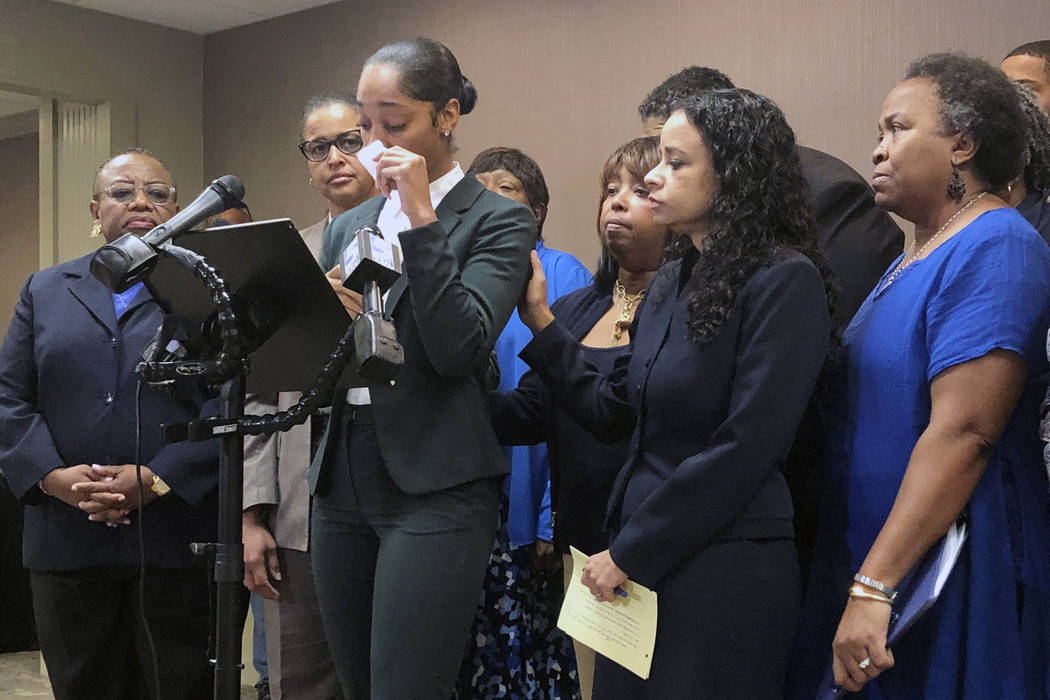Former NAACP employee accuses supervisor of sexual harassment

RALEIGH, N.C. — A sexual harassment claim against a North Carolina NAACP official is raising questions about how the national organization handled the case and whether a nationwide policy on sexual harassment is overdue for the venerated civil rights organization in the era of #MeToo.
A former youth and college director for the state chapter, Jazmyne Childs, said at a news conference Tuesday that she endured unwanted physical contact and harassment starting shortly after her employment began in 2017. She identified the harasser as her supervisor, the Rev. Curtis Gatewood, who is running for president of the state chapter, challenging the incumbent.
Childs, 27, said she came forward because the national NAACP didn’t respond to her letters seeking that it expel Gatewood from membership, something state chapters cannot do.
“First, I was violated by the Rev. Curtis Gatewood, then violated by the national NAACP,” she said.
The NAACP, she said, “cannot fight racism and protect sexism.”
At its 2018 convention, the NAACP approved a resolution supporting the #MeToo movement against sexual harassment and assault. It resolved that the NAACP will “ensure that all of our volunteer and NAACP staff will continue to be trained to recognize and address actions that fail to create an empowering environment for all who work and volunteer with our organization.”
But the organization has failed the women within its own ranks, said Childs and the Rev. William Barber, the state chapter president at the time of Childs’ employment and a member of the national NAACP board.
“I’ve given my heart and soul to this organization, and I’m ashamed,” said Barber, who now leads the Poor People’s Campaign.
Childs said the most egregious harassment occurred in February 2017 as she prepared a dark room for a surprise party for a departing colleague.
“As I was unpacking food and setting it up on the table, I felt someone’s breath on my neck,” she said, crying and struggling to maintain her composure. “And then I felt him press his penis against my buttocks.”
She said she saw her supervisor, Gatewood, and yelled, “Why are you hovering over me? That’s gross.”
He said he was looking for a receipt and “stormed out,” she said.
Gatewood, 60, said in a Facebook message that he has never sexually harassed anyone. Airing grievances in public “makes us no better than the lynch mobs the NAACP was formed to fight when such disputes are used as political weapons and unfairly aired or decided in the media or within the court of public opinion,” he wrote.
After Childs complained, Barber ordered an independent investigation by attorney and professor April Dawson. She found that Childs was a credible witness and Gatewood was not.
Dawson concluded that Gatewood “made inappropriate contact” with Childs and that his conduct was “unwelcome, of a sexual nature and objectively intimidating, hostile or offensive.” She found that each incident that Childs reported had occurred.
Ana Ilarraza-Blackburn, the Latino immigrant liaison for the state NAACP, said women in the state NAACP will travel by bus Thursday to the national headquarters in Baltimore to demand Gatewood’s expulsion, followed by a news conference.
When she sought Gatewood’s expulsion, the national organization instead recommended that Childs get a cease-and-desist order in 2017m she said. She did so, and the state chapter banned Gatewood from NAACP events, Childs said. “But he defied the order and appeared anyway to stare me down,” she said.
Earlier this month, she filed a formal request to National NAACP President Derrick Johnson and other officials demanding Gatewood’s expulsion under the NAACP constitution. She hasn’t heard back, she said.
Johnson didn’t respond to emails or text and phone messages left for him by The Associated Press. A spokesman also didn’t respond to an email.
The national NAACP doesn’t have a sexual harassment policy, and it would be great if it did, Barber said. But, he said: “This isn’t about the lack of policy. This is about the lack of principle to act right.”